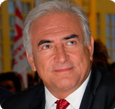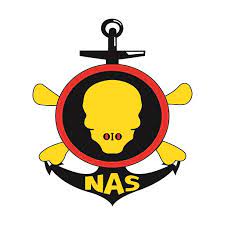Nigeria and the International Monetary Fund (IMF) yesterday charted the path for economic growth and good governance for the country.
While the IMF identified the absence of fiscal responsibility among the three tiers of government in Nigeria as hindering the country's development, Nigeria charged the Fund to repackage its policies to facilitate the nation's development.
IMF Managing Director, Dominique Strauss-Kahn, yesterday in Abuja when he visited the Speaker of the House of Representatives, Mr. Dimeji Bankole, noted that Nigeria's impressive revenue profile had not translated to better living conditions for the people.
But Bankole said that if the IMF repackaged its programmes for Africa to address the continent's problems, Nigeria and the continent would come out of its woods sooner than expected.
Strauss-Kahn, who said that Nigeria is one of the highest revenue earning countries in the world, remarked that whether the money was being used for the benefit of the country in future was another thing. "I am happy to be here this morning to hear from you the way you see this problem of fiscal responsibility. Nigeria could be regarded as one of the highest in terms of revenue earning as compared to other countries in our report. And the question of whether or not the revenue is being used to project the future is the main question at stake."
He said he was in Nigeria to hear from stakeholders the issue of fiscal responsibility in the country, stressing that Africa and Nigeria in particular, were of interest to IMF. "IMF is here to try to help you as per fiscal responsibility, obviously that's the reason why I am really interested in hearing from you the way you see it and I understand that throughout the country, there is problem of fiscal responsibility. I decided to visit Africa on behalf of the IMF because for us in the IMF, Africa is obviously one of the most important continents in the world. Nigeria being the most populated country in the region, and proudly one of the most visible economies for the future of the continent, is critical to the IMF. I had the honour of meeting with the economic team this morning (yesterday) and had discussions on the issue of fiscal responsibility. So really it is an issue," he said.
Responding, Bankole told Straus-Khan and his team that the country mismanaged the oil boom era in the past because of the absence of the legislature, adding that things had changed for the better because the present administration had risen to the challenge. He told the IMF that the time had come for it to repackage its programme with a view to tackling real problems facing the nation, particularly in the area of capacity-building instead of money lending.
"You touched on something that is huge and massive. You are coming to a country that represents one in four in the sub-Saharan Africa. If we solve the problem here, we have solved the problem in the West, Central and Eastern part of Africa.
"There is a lot of politics in IMF. You have a lot of interest in Africa. You don't need to go far. I'm not quite sure what the IMF intends to do in this part of the world. That we mismanaged the oil boom of the 70s and early 90s is well known. However, in the last four years, the price of oil has gone from $30 to over $100 per barrel today. We have been able to save some money and we have been able to increase the reserves. I think that has to do with sheer luck or common sense," he said.
Bankole continued: "We have had good managers in the last four years. A situation whereby we borrowed billions of dollars in the early 80s and paid about $35 billion four years ago meant that may be our financial managers were not the best."
He also told Strauss-Khan that it was clear that these monies were lent to governments that had no legislature and therefore there was no way they could ask questions about the funds borrowed or lent. And as they say, absolute power corrupts absolutely."
The Speaker expressed concern over the way Nigeria was being perceived in terms of foreign debt and loans. "Some started with debt forgiveness, which again was an insult. I know you don't forgive debt. Relief, yes. The fact that there are bad managers does not mean the whole world should be taking advantage of us. If we are the most corrupt four years ago, I wonder what could be said about Switzerland, whose economy was built with funds from these so called corrupt nations. In the last four years, there were some kind of economic reforms and I realised it was actually economic restructuring. But if we were to take the required output to build the capacity of the legislature, then we are the better for it.
"What we do in the House is the input, output and outcome theory. The fact that we are bad managers doesn't mean we are all corrupt. In the last four years, we have been restructuring. We have set good steps. If we get the desired output as a responsible legislature, then we would have tried", he said.
Bankole also told his visitors that the House had taken the issue of accountability very serious, which led to the delay in the passage of the 2008 budget and noted that the exercise paid off with the recovery of some unspent funds amounting to N450 billion. "We will follow the money. But again we need a long-term budget to realise the needs of the people. The delays were actually caused by the scrutiny we had to do. But I must tell you that before we can consolidate on this, we need to have so many legislatures coming back. IMF can begin to show interest in the House and how to retain the capacity-building mechanism. We need a situation whereby when a minister comes you have a legislature, which knows more than the minister," he said.
From John-Abba Ogbodo, Abuja
The Guardian
Thursday, February 28, 2008




